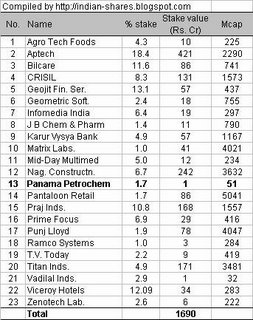Interesting article. Web 2.0 is centered around Google. I thought about it but not as intensive. Let the IT Gods bless every one and every one profits. I don't want to see that.
No matter I am bullish on the stock and respect the people working over there. I have little concern over the stock prizes of tech firm.
Read more Seeking alpha
 Thomas Hawk submits: Dave Winer has an interesting observation out today about the Web 2.0 bubble. Since most of the Web 2.0 companies are not going public, the question Dave raises is how will we know when the bubble bursts. Dave suggests that we'll know when Google's (GOOG) stock crashes.
Thomas Hawk submits: Dave Winer has an interesting observation out today about the Web 2.0 bubble. Since most of the Web 2.0 companies are not going public, the question Dave raises is how will we know when the bubble bursts. Dave suggests that we'll know when Google's (GOOG) stock crashes.
Since most Web 2.0 companies are not selling stock to the public, and are mostly funded by VC money, the argument would be that we would not likely see a dramatic fallout like we did with the tech stock market in 2000-2002.
But Dave thinks that Google has a big impact on the health of the Web 2.0 playground and that as go Google's prospects, so goes Web 2.0.
And this might be true to the extent that so many Web 2.0 companies business plans are built on eyeballs and advertising. But there are some that are generating real revenue and real profits and these might be the ones that survive even if we do see a Google induced Web 2.0 crash.
With Google's current P/E ratio sitting at about 60 times earnings it does make you wonder: Is Google's stock price already set for perfection? What if advertising revenues don't come in in line? What if there are cracks beneath the surface of Google that we don't know about?
Earlier today, on his Real Money Radio Show, Jim Cramer was lathering Google up good, like only he knows how. He was praising the pathetic Verizon deal (there is no way people are going to pay $15 per month for YouTube on their phone) and telling viewers that they need to buy Google now. This kind of stuff worries me. Cramer is pure hype. And hype builds speculation which builds panic which builds crashes.
Of all of the stocks in the Standard & Poor's 500, Google has the 11th highest overall analyst rating out there. Wall Street could not be more bullish on the stock. Buy, buy, buy, buy. But there is very little room for more enthusiasm left on the stock. A single solitary analyst, Philip J. Remek over at Guzman & Co. (an investment company that no one has heard of of course), is the only analyst on Wall Street saying sell. And even there Guzman's target price for the stock is $460 a share, a mild drop from where it sits today. Contrast that with Safa Rashtchy over at Piper Jaffray who says that Google is going to go to $600 a share or with Mark Rowen over at Prudential who says that Google is going to go to $575 a share and you really do have a stock priced for perfection.
Personally, I'm scared of Google's stock price. I don't own the stock myself and worry that it could be set for a fall. And if it falls, I worry that Dave might be right and that the collateral damage that impacts the entire Web 2.0 could hurt a lot of great companies and businesses.
GOOG 2-yr chart:



 Coming on the heels of last month's $15.5 billion offer by Apollo Management Group and Texas Pacific Group to buy Harrah's Entertainment, the largest casino operator in the world, a second buyout group is now considering an offer for the company. The new offer, led by Penn National Gaming, which owns casinos and racetracks, and D. E. Shaw, the hedge fund, sent shares up 2.5% yesterday after it was announced on CNBC. Any buyout would require the new owners to obtain a license to operate gambling businesses in the state of Nevada, a requirement that has stymied deals for casino operators in the past.
Coming on the heels of last month's $15.5 billion offer by Apollo Management Group and Texas Pacific Group to buy Harrah's Entertainment, the largest casino operator in the world, a second buyout group is now considering an offer for the company. The new offer, led by Penn National Gaming, which owns casinos and racetracks, and D. E. Shaw, the hedge fund, sent shares up 2.5% yesterday after it was announced on CNBC. Any buyout would require the new owners to obtain a license to operate gambling businesses in the state of Nevada, a requirement that has stymied deals for casino operators in the past. 